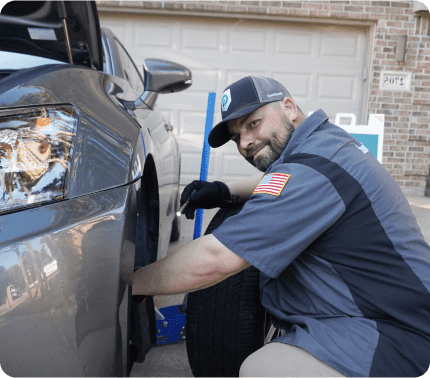Mitsubishi Car Repair

Mechanic Comes To Your Home
2 year Service Warranty
7 days/week, 9 am - 9 pm
As featured in
Meet Our Certified Mitsubishi Mechanics
Background checked
Passed Goodhood's rigorous test
Carlos was fantastic - quick and friendly service, and I learned a lot in the process! Thanks Carlos, you’re a lifesaver!
- Car
2014 Lexus Is 250
- Amount Paid
$108
FAQs
How Often Should I Have My Oil Changed?
The frequency of oil changes will vary depending on your specific vehicle model and driving habits. However, most Mitsubishi models will need an oil change every 5,000 to 7,500 miles.
My Engine Is Making a Strange Noise, What Could Be the Problem?
Strange engine noises can be caused by a variety of issues, so it's best to have a professional Mitsubishi mechanic take a listen. It could be something as simple as low oil levels or a loose belt, or it could be a more serious issue like engine damage.
I’m Due for a Tune-Up, What Does That Entail?
A tune-up is a preventive maintenance service that helps keep your vehicle running smoothly and efficiently. It typically includes an oil change, new spark plugs, and a thorough inspection of the engine.
My Check Engine Light Is On, What Does That Mean?
The check engine light in Mitsubishi cars can indicate a variety of different issues, ranging from something as simple as a loose gas cap to a more serious problem like engine damage. If the light is on, it's best to have a professional mobile mechanic diagnose the problems with your Mitsubishi vehicles.
What Is Some Common Mitsubishi Repair?
The most common Mitsubishi automobile repairs are exhaust system repairs, engine repairs, and brake repairs. However, any make or model such as the Mitsubishi Lancer, Mitsubishi Eclipse, or Mitsubishi Outlander can experience any type of repair, so it's important to be prepared for anything.
What Are the Most Common Engine Repairs for a Mitsubishi Mechanic?
Engine repairs can be caused by many different things, but some of the most common repairs include valve adjustments, oil leaks, and timing belt replacements.
What Are the Most Common Exhaust System Repairs for Mitsubishis?
The most common exhaust system repairs include replacing the catalytic converter, muffler, and pipes. The catalytic converter is an important part of the emission control system, and it can become clogged or damaged over time. The muffler helps to reduce noise, and the pipes can become corroded or damaged.
What Are the Most Common Brake Repairs for Mitsubishis?
Brake repairs can be caused by many different things, but some of the most common repairs include replacing brake pads, rotors, and calipers. Brake pads typically need to be replaced every 20,000 miles or so, and rotors should be replaced every 60,000 miles. Calipers can also become damaged or corroded over time, and they may need to be replaced as well.
How Can I Prevent Mitsubishi Repairs?
There are a few things that you can do to help prevent Mitsubishi service repairs, but the best way to avoid them is by taking your car in for preventative maintenance. You can also keep an eye on the fluid levels and tire pressure, and make sure to change the oil and filters when needed.
What Are the Symptoms of a Broken Engine?
Most Mitsubishi motors problems arise because of the symptoms below:
The vehicle is difficult to start and usually doesn't run smoothly
Loss of power; acceleration is not smooth or consistent
Problems in starting - such as, when you turn the key, it feels like nothing has happened or there's a clunking noise
Difficulties in changing gears
The engine is making strange noises - such as knocking or ticking
Smoke coming from the exhaust
Excessive fuel consumption
Loss of coolant or oil leaks.
If you notice any of these symptoms, it's important to consult with a mobile mechanic as soon as possible to avoid further damage.
How Do I Change the Oil in My Mitsubishi?
Changing your oil can be messy, but it's a necessary chore if you want to keep your car running smoothly. Here are some tips to make the process a little bit easier:
Make sure you have all of the supplies you need before you start, including a new oil filter, oil, funnel, and rag.
Park your car on a level surface and put it in neutral.
Locate the oil drain plug under your car and place the oil catch basin underneath it.
Unscrew the oil drain plug and allow the oil to drain out completely.
Replace the oil drain plug and tighten it securely.
Remove the old oil filter and replace it with a new one.
Fill the oil reservoir with the recommended type of oil.
Start your car and check the oil level to make sure it's correct.
If you're not comfortable changing your own oil, you can always have a mobile mechanic from Goodhood change it for you. They'll be able to do it quickly and efficiently, and you won't have to worry about making a mess.